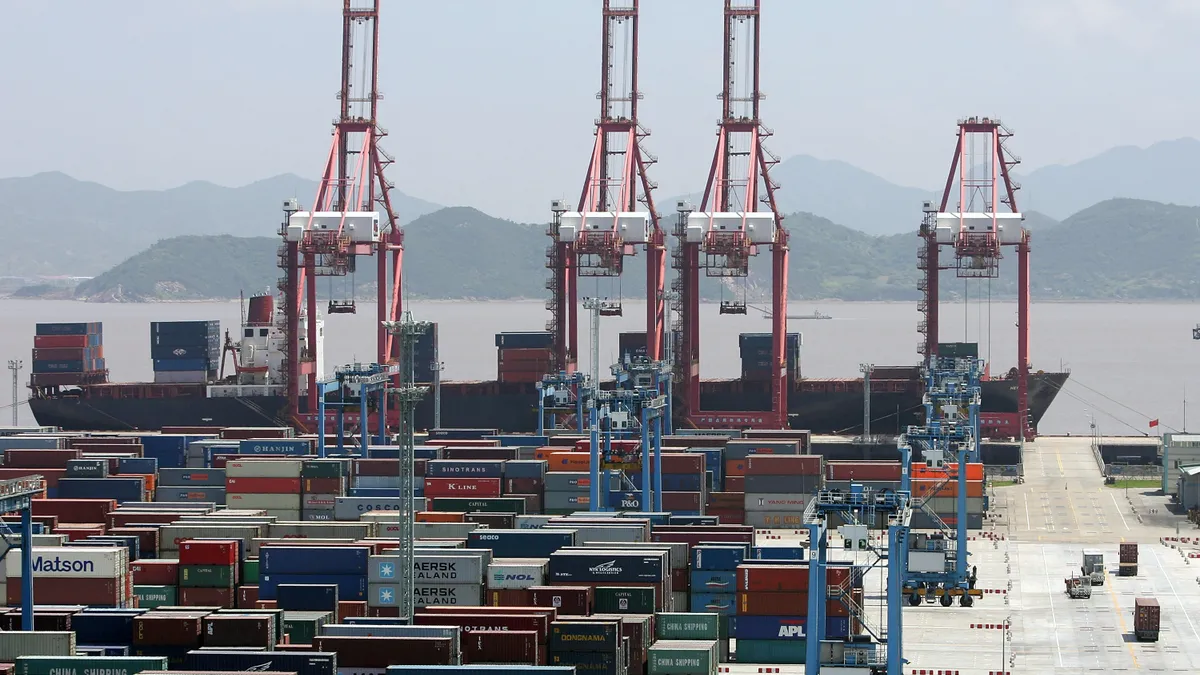Dive Brief:
- Sourcing from Chinese manufacturers is chief among supply chain risks in 2023, according to analytics firm Everstream’s annual risk report.
- The analysis gave a 90% risk score to the possibility of delays and cancellations from China-based suppliers, noting the continued likelihood of localized COVID-19 disruptions in the country. “Assurances from your Tier 1 suppliers that they don’t do business with China isn’t sufficient protection because those suppliers probably don’t have visibility through their entire supply network,” the report noted.
- Everstream also pointed to cybercrime, ESG violations, high commodity prices from Europe — stemming from energy shortages — and financial insolvencies in the supply chain as the other key risks facing companies this year.
Dive Insight:
While U.S. leaders of both major political parties have framed the concentration of production in China in geopolitical and policy terms, companies have faced more practical business risks from an overreliance on the country for manufacturing in recent years.
COVID-19, and the Chinese government’s responses to it, have created numerous supply chain difficulties for foreign firms. Everstream counted 85 lockdown in China in 2022, with 18 of those coming from just the month of November.
After the Chinese government lifted its “zero-COVID” policy, the ensuing spike in cases created new strains on factories as workers fell ill.
“Currently, China’s rapidly changing COVID-19 policies create ongoing headaches for manufacturers as companies and workers struggle to adapt to shifting local policies,” Everstream said in its report.
Everstream also tied some financial risk to sourcing from China, though the country isn’t alone there.
Across China, Germany and the U.S., manufacturing and electronics companies suffered the most insolvencies. China accounted for the highest share of insolvencies in electronics, automotive and chemical sectors, according to Everstream.
Amid demand slumps, purchasing cuts and more costly capital, there is a risk down the road in 2023 that financial insolvencies could disrupt supply chains. Everstream gave a 60% risk score overall to the possibility that a small business bankruptcy could suspend or end production at at least one supplier.
A supplier going out of business can, at the very least, add costs and production time as companies seek alternatives.
“Those small-business closures don’t often get much attention, but they will catch many companies by surprise this year, creating a bullwhip effect that could halt production,” Everstream said.
In addition, the firm linked the possibility of an ESG violation — which Everstream gave a risk score of 75% — to China as well. Everstream found that it identified 177 sub-tier suppliers linked to forced labor of the Uyghur people in China’s Xinjiang region.
“Any company sourcing electronic components is exposed to ESG violations as some of China’s largest copper, nickel, and lithium producers have been accused of utilizing forced labor in Xinjiang,” the report noted.
Along with media and NGO investigations, Congress has taken an interest in the issue as well, with lawmakers already this year questioning automakers and the fast fashion giant Shein about their due diligence practices to keep forced labor in Xinjiang out of their supply chains.















